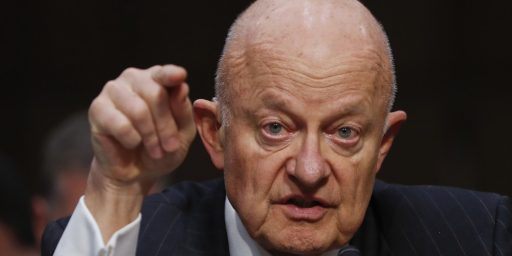Of Course the NSA is Lying to You
My latest for The National Interest, "Clapper's Bodyguard of Lies," has posted.
My latest for The National Interest, “Clapper’s Bodyguard of Lies,” has posted. The crux:
National Security Agency chief Michael Hayden took to the op-ed pages of USA Today Monday to lament that our conversation about the NSA’s spying isn’t more “fact-based, rather than contaminated by unreasonable fear, ignorance, misinformation and more than a little posturing.” But Clapper was able to supply few facts and dispel little of the ignorance. Indeed, his closing jab, that “both our privacy and our safety that could be in peril,” contributes to a climate of fear—how reasonable, most of us aren’t in a position to say—and contains more than a little posturing.
Then there is Senator Ron Wyden, an Oregon Democrat who sits on the intelligence committee. He has been an outspoken critic of these programs in general and about misleading statements from intelligence community leaders in particular. In a speech at the Center for American Progress, he asked, “When did it become all right for government officials’ public statements and private statements to differ so fundamentally?” The question was apparently rhetorical: “The answer is that it is not all right, and it is indicative of a much larger culture of misinformation that goes beyond the congressional hearing room and into the public conversation writ large.”
While I share some of Wyden’s misgivings about the scope of the government’s collection of information on American citizens, and indeed the general weakening of the Bill of Rights in the fight against global terrorism, this charge strikes me as naive, if not silly. By its very nature, a culture of misinformation follows a culture of secrecy as night follows day. As Churchill understood, questions will come up and misinformation is necessary to divert people from stumbling on the truth.
Much more at the link. I welcome your comments below.
Correction: I originally misattributed Hayden’s op-ed to Clapper. I apologize for the error.







Ron Wyden’s no dummy. He asked Clapper that question specifically because he knew Clapper would have to choose between revealing classified information or lying. Were I placed in the same position, I’d have lied my ass off.
“By its very nature, a culture of misinformation follows a culture of secrecy as night follows day. ”
Another way to phrase it is that classifying the truth allows government officials to get away with lying.
Please remember that this man claimed that Iraqi WMD’s were moved to Syria.
The one area in which I disagree with you on this, James, is that I think that every single Congressman has all of the authority that he or she requires to ask questions to which they are entitled to truthful answers from executive branch functionaries. That they believe they must ask the questions at all is a token of the level of mistrust that the executive branch has engendered.
Demanding that Congress exercise oversight while winking at executive branch lies, obfuscations, and/or stonewalling is nihilism.
This is not merely an issue of partisan politics. Ron Wyden is a Democrat and he’s neither a conservative nor an enemy of the administration.
What recourse does Congress have? Should they be withholding funding? Should they be impeaching offending officials? Would those be more productive and amicable solutions? I don’t see it.
Many Americans expect the government to be omnipotent when it comes to stopping the “bad” guys, while simultaneously respecting the privacy of all of us “good” people. With so many citizens holding such unrealistic and conflicted expectations, it’s all but impossible for the government not to lie one way or the other.
Humm… by following the link — “ACCESS DENIED”. By googling The National Interest — no article titled ‘Clapper’s Bodyguard of Lies’. Maybe it’s my breath?
I’ll toss out a thought that somewhat relates to our friend Todd’s, that there is probably a quantifiable and inverse relationship between the general openness in society to information and the amount of information that the security apparatus wants for itself. When secrets could be passed along in sealed dispatches and disappearing ink was a clever technology, there were fewer secrets that a state guarded jealously. Today the number of pizzas delivered to the Pentagon on a given night is probably TOP SECRET! because it correlates so exactly with increased pace of operations.
@Dave Schuler:
That’s a whole lot different from demanding the DNI provide an answer that would certainly contain classified information in a public forum.
Wyden could have gotten his answer behind closed doors, if he really wanted one. But he didn’t want an answer, he wanted to force Clapper to lie and then call him on it.
@Mikey: It’s a false premise – there is a third option available, and that is refusing to answer the question at all. If the subject is classified, or should not be discussed in open session, Clapper could have just said that & insisted the session be closed before discussing the topic at all. But instead he had to shoot his mouth off and commit willful perjury. That’s why I cannot trust his judgement in other areas.
@legion: That’s a good point, but at the same time, as James notes in his piece, those sorts of statements are generally taken as a tacit admission of the program’s existence.
I’m no fan of Clapper, but the fact his answer was clumsy and stupid doesn’t change the fact Wyden should never have asked the question in that forum in the first place.
No. Once the president has allowed one of his subordinates to appear before Congress (rather than testifying himself) that subordinate is obligated to answer any question asked truthfully and completely.
Think of it as analogous to a chain-of-command issue. A failure by an army corporal (or even a colonel) to salute an admiral or give a truthful answer to a question asked of him or her by the admiral is insubordination, a court martial offense.
@Dave Schuler: Congress is not in command of anyone in the executive branch.
A classification of Top Secret is given to information the revealing of which would cause exceptionally grave damage to the United States. What should Clapper do if answering “truthfully and completely” means revealing that information?
He could have answered much more intelligently, but I’m not going to fault him for trying to get out of revealing it.
@JohnMcC:
Happened to me too. A refresh fixed it.
As for the article, gotta say, James, I loved the economy of thought in this sentence:
I’ve been out of the loop for much of the last week, but this morning I read in my blogscan the outrage over Greenwald’s boyfriend being detained, as if there were no “selective, criminal leaks of classified data” at all.
@Mikey:
From the standpoint of testimony before Congress you’re completely wrong. Congress’s oversight responsibility gives them all of the authority they need.
I think it’s reasonable to say that Congressmen shouldn’t be asking certain questions. I think it’s reasonable for the president to claim executive privilege to prevent his subordinates from testifying before Congress. I don’t think it’s reasonable to say that executive branch functionaries shouldn’t be answering Congress’s questions or should lie to Congress.
@Dave Schuler: So Wyden can compel Clapper to break the law? Because that’s basically what he was asking for.
When Congress’ authority to compel testimony conflicts with laws barring the disclosure of classified information, what should we do? Can Clapper just say “I’m not answering any more questions, have a nice afternoon” and walk out? I know a member of Congress can call for a hearing to be moved behind closed doors, but can the subject of questioning do so? If not, what choice did he have?
@JohnMcC: @James Pearce: There was an attribution error of my part and they took it down while it was being fixed.
@Dave Schuler: @legion: I’m very, very reluctant to grant Executive officials the right to lie to Congress. Dave’s right in that, while Congress isn’t in the chain of command, they absolutely have the right to demand truthful answers from government employees from Cabinet Secretary down to Army private.
But, as I note in the piece, Clapper couldn’t give a truthful answer in open session and refusal to answer would have essentially communicated the program’s existence. In this particular case, as I’ve noted elsewhere but neglected to note in this piece, Clapper was forewarned about the question and should have headed off its being asked. But, it having been asked, his response was reasonable.
What he should have done, though, is gone to Wyden and/or the committee leadership afterwards and delivered a secret, truthful answer to the question posed.
@Dave Schuler:
As a general rule? Sure.
But there are always exceptions. Such as when a Congressman wants to goad an executive branch functionary into revealing classified information outside normal channels. Evasion or distortion is not only reasonable in that circumstance, it’s justifiable.
@James Joyner: Came back to say ‘link fixed’. And thank you for introducing me to TheNationalInterest. A damn interesting book review (John Gray’s ‘the Silence of Animals’), a thought provoking critique of Abenomics (BUY GOLD!), a preview of the autumn’s budget fights by Grover Norquist (not read) — definitely a superior right-side journal, therefore something for an old lefty pseudointellectual to cherish. Lacing up the gloves as I speak.
@Mikey:
I think he’s obligated to do so. And Congress can convict him of contempt of Congress and/or fire him for doing it. The president could claim executive privilege.
James Clapper should have been fired by the president long since. I don’t think that the president sent him to the Hill to lie but he did lie. Now he’s a discredit to the administration.
@Dave Schuler: The problem is that there are probably secret government agencies that Congress and even the president are not aware of. Agencies that create secret, underground, rogue agencies.
FTA: Federal Tricycle Authority
“I’m going to Jackson …look out Jackson town” (Cash)
“Think of it as analogous to a chain-of-command issue. A failure by an army corporal (or even a colonel) to salute an admiral or give a truthful answer to a question asked of him or her by the admiral is insubordination, a court martial offense.”
Nope. A corporal never gets asked these kinds of questions in televised hearings. If Congress is being lied to when they ask questions in private, that is a serious issue. In a public forum, they should expect vague and misleading answers.
Steve
@Dave Schuler:
Interestingly enough, you don’t find Senator Wyden ( or any Senator) calling for Clapper to be fired. Wonder why that is?
Apparently the folks most concerned with Congressional privilege and oversight don’t think Clapper committed a fireable offense. I find that telling.
@stonetools:
Again, the president should have claimed executive privilege and refused to have Clapper testify.
@Dave Schuler: So basically Wyden’s question put Clapper in the position of breaking the law (revealing classified info), breaking the law (lying to Congress), or breaking the law (walking out and being held in contempt).
I’d say he chose the least of those three evils.
What he should have done was lie, then get caught in it, then resign. Or get fired. Either way, there would have been some consequence.
@Dave Schuler:
Though I share your thoughts the idea that you can delegate authority but not responsibility left the barn around 1986.
It sucks but that’s where we’re at these days.
The problem with oversight…is oversight.
This makes me think of the Darrell Issa BENGHAZiiiii!!!!! hearings…in which they outed a covert CIA operation. (Republicans, it seems, are good at outing secret things…like operations and operatives)
There is a way for Congress to perform the necessary…yes necessary…oversight in a manner that is not counter-productive to intelligence work.
It’s not about big Government or Small Government…it’s about Smart Government.
Hard to know was is “related” to this story as the tentacle count defies any rational counting. The outspoken Jonathan Turley seems to have lost his blog for the moment. I do hope it’s just a WordPress glitch. Can anyone report on Mr. Turley’s health?
http://jonathanturley.org/
UPDATE: It was a glitch. He is back.
The thing that annoys me here is that Wyden sits on the intelligence committee. He was already briefed on the information he was asking about.
He asked a question that he already knew the answer to precisely to put Clapper into the position of being forced to lie or reveal state secrets in a public forum.
For no other reason than Wyden has decided, by himself, that these programs shouldn’t exist, and since he can’t convince his colleagues to fall in line behind that lunatic goal, he’s going to take unilateral action to target them himself.
Asking that question in a public forum should, at the least, have been cause for censure, and ideally, removal from his seat on the intelligence committee. The man can’t be trusted with sensitive information and doesn’t respect the law.
@Dave Schuler:
And of course, if the President had claimed executive privilege, the civil libertarians would have gone apesh!t .
“Worse than Bush; worse than Nixon, etc.”
Again, if Wyden and the senators found Clapper’s lie so offensive, why aren’t they beating the drums calling for Clapper’s termination, maybe with “extreme prejudice” for committing this heinous offense? Maybe its not all that heinous, despite much libertarian outrage on the Internets?
Speaking of lying…Rick Perry is in negotiations to accept $100M in Obamacare money.
Money talks…BS walks.
Republican hypocrites…a redundant term.
@Dave Schuler:
The same recourse it’s always had. There’s nothing new here. The obvious course is to do what Congress typically does to reign in the Executive in this area, which is legislate additional oversight and reporting requirements. That would, however, actually require Congress to do something beside yapping and shifting blame for their own failures.
So, if there are any Congrescritters reading this, I have some specific suggestions which should be tied to any legislation that the President could not safely veto. Fortunately there is some actual bi-partisanship on this issue, so I don’t think reform is completely hopeless.
1. Strengthen the FISA court. Mandate transparency at a minimum.
2. Increase reporting requirements to the Congress for oversight purposes. The reality is that Congress has no inherent right to demand classified information unless it is required by statute. So, write a statute requiring disclosure and be specific. I would start with the NSA compliance division audits.
3. An interesting fact is that less than 10% of lawmakers have a staffer with a security clearance and the expertise to provide advice on these issues. We all know why that’s the case, but there’s no reason Congress cannot expand the preview of the CRS to include intelligence matters. Require them to staff the right people and build a classified reading room where members of Congress can go to get information without having to go through the intelligence committees.
4. One of the main reasons the NSA is storing metadata is to ensure they have access to it when they have a tip and need to do link analysis. Communication companies don’t keep this information long enough for this purpose, so the NSA interpreted the law (with approval from the intel commitees and the FISA court) to collect and store the data to ensure it was available for analysis. One way to allow the NSA to keep doing the job its doing while preventing it from collecting all that metadata into a single database with questionable security is to require communication companies to archive such data for five years. That way, the metadata is no longer centralized and directly accessible to the US Government, yet it is still technically available. If the government receives a tip, then they can petition to FISA court to issue a warrant or authorization to get specific link data from the telecomm company. An arrangement between three parties (FISA, NSA, Telecom companies) is much safer in terms of government surveillance fears, though it’s not without downsides. This arrangement also makes oversight a lot easier.
That’s the simple stuff. Long term Congress and the nation should visit how the fourth amendment applies to third-party information, which is at the heart of the metadata program. On the one hand, there is this faction that cries about “corporate personhood,” but without corporate personhood, corporations would have no 4th amendment rights and so could be compelled to hand over anything the government wants. So, our country will eventually have to come to some consensus about where to draw the red lines these issues and a lot o other moving parts. We’ve done it before with wiretaps and I think we’ll get there eventually.